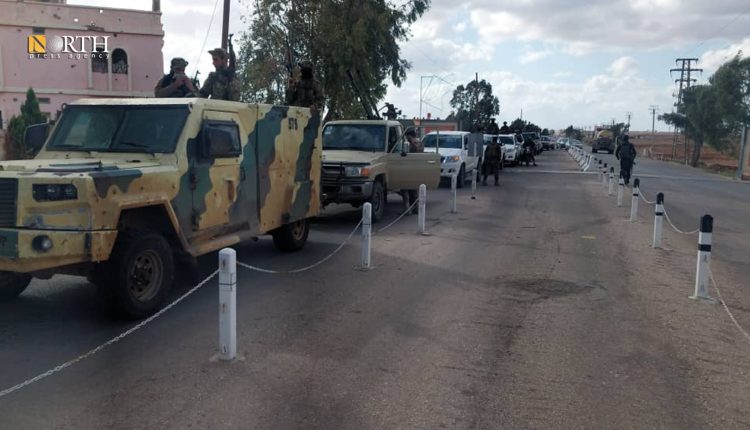Syrian Security Forces Deploy in Bosra al-Sham After Killing of Defense Commander
By Kardo Roj
DARAA, Syria (North Press) – Syrian security forces and Defense Ministry units began deploying military posts in the southern city of Bosra al-Sham on Saturday, following heightened tensions sparked by the assassination of a military commander earlier this week.
Local media sources reported that the deployment came after a series of meetings between officials from the Ministry of Defense, the General Security apparatus, and representatives from the former Eighth Brigade—a group previously affiliated with the Russian-backed Fifth Corps and based in southern Syria.
The move follows the killing of Bilal al-Droubi, a senior Defense Ministry commander, reportedly by armed elements linked to the former Eighth Brigade. His death has reignited concerns over the fragile security environment in southern Syria, particularly in areas formerly controlled by reconciled rebel factions.
According to Ahrar Horan Gathering, an outlet focused on southern Syria, the parties involved in the recent talks reached a consensus to establish six military points within Bosra al-Sham to bolster state control and monitor security developments in the area.
The agreement reportedly took place during a closed meeting at the historic Bosra Castle, involving military and intelligence figures from both the government and local actors. The meeting also included demands for the surrender of suspects allegedly involved in al-Droubi’s killing.
Attempts by some former Eighth Brigade commanders to prevent the initial entry of security forces into the city were ultimately overridden by higher-level coordination between factions and Damascus. The swift deployment reflects an effort to de-escalate a potentially volatile situation through negotiated security arrangements rather than open confrontation.
Since the 2018 Russian-brokered reconciliation deals that brought much of southern Syria nominally back under government control, the region—particularly Daraa—has remained plagued by insecurity. Assassinations, inter-factional conflicts, and tensions between state security bodies and local groups are common, often resulting in flashpoints like this week’s events in Bosra al-Sham.
Despite government presence, many communities in Daraa maintain semi-autonomous dynamics, with former opposition commanders continuing to wield influence. This has created a complex security matrix where loyalties and power structures remain fluid.
Bosra al-Sham, once a key opposition hub and the headquarters of the now-defunct Eighth Brigade under commander Ahmed al-Awda, is emblematic of this tenuous balance. Though officially integrated into state structures, residual grievances and power struggles persist beneath the surface.
The events in Bosra al-Sham are a stark reminder of the challenges facing Damascus in consolidating authority in the south. The central government continues to rely on negotiated arrangements and local intermediaries to manage security—a strategy that, while reducing open warfare, has struggled to prevent targeted violence and criminality.
The deployment of new security points is unlikely to fully neutralize these risks, but may temporarily stabilize the city and deter retaliatory attacks. However, the underlying causes—fragmented loyalties, economic deprivation, and the absence of sustained reconciliation—remain unaddressed.
As the Autonomous Administration of North and East Syria (AANES) and its military partner, the Syrian Democratic Forces (SDF), continue to emphasize inclusive governance and security in the northeast, the contrast with ongoing instability in areas like Daraa highlights the broader challenges facing Syria’s political future.

